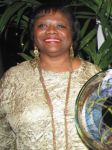This fifth segment, with a focus on cancer, is part of an eight-part series on health disparities in the Pittsburgh region. These segments are a collaboration among the New Pittsburgh Courier, Community PARTners (a core service of the University of Pittsburgh’s Clinical and Translational Science Institute—CTSI), and the Urban League of Greater Pittsburgh. Pitt School of Medicine assistant professor Michael Yonas, DrPH, sat down with Esther Bush, president and CEO of the Urban League, to discuss this month’s focus on cancer among African Americans in Allegheny County.
 |
| ESTHER BUSH
|
MY: Cancer seems to increasingly have an effect on everyone’s lives. What are things you feel that people should think about to lower their risk for cancer?
EB: As we see from the interviews with Drs. Chu and Robertson and the data presented, cancer comes in many forms. There are choices that we can all make to lower our risk for cancer. One of the most important is to try to maintain a healthy lifestyle, as we have discussed in our previous segments. It is also important to know your body – what is normal for you? In addition to regular recommended health screenings, knowing your own body is key to noticing abnormal changes that may have negative health implications. Knowing your family health history and talking to your doctor about your risk for cancer are also important.
MY: These are great points. Is there anything that stands out as being most important for reducing disparities in cancer?
EB: Early detection is one of the best ways to identify cancer and, through early treatment, improve your chances of long-term survival. For some cancers, like breast and prostate cancer, screening is the only way to detect cancer at its earliest stages. The Pittsburgh Affiliate of Susan G. Komen for the Cure® and the Obediah Cole Foundation for Prostate Cancer are two local organizations that provide education and screening resources for those who need them. African Americans are disproportionately affected by cancer, especially in terms of mortality rates. We need to be informed and involved when it comes to our health. Anyone can call the Community PARTners Core at 1-866-422-1575 for more information about resources and opportunities to participate in research.
MY: What can we do to help those we know who are affected by cancer?
EB: We all probably know someone, either a loved one or a friend, who has been diagnosed with cancer at some point in their lives. Cancer affects all of us as families and communities. It is important that we support each other through this time, be informed of the resources we have here in Allegheny County and not hesitate to ask for help.
Take charge of your health today. Be informed. Be involved.